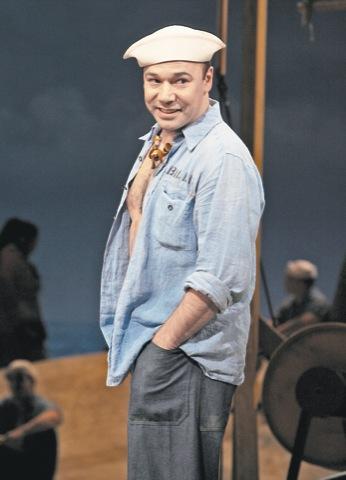By Raphael Sugarman
In the several years this theater column has been profiling Queens’ actors and artists who work behind-the-scenes on and Off Broadway, there has likely never been a performer whose personal history has been so tied to the borough as that of Danny Burstein, who plays Luther Billis in Rogers and Hammerstein’s “South Pacific.”
Burstein attended PS 120 in Flushing and Parsons Junior High. Stuart Glazer, his theater teacher at Parsons, recognized his raw talent and suggested he try out for the High School of Performing Arts in Manhattan.
“I said, ‘Great, and what is the High School of Performing Arts?’” Burstein recalled asking his teacher.
Glazer told the boy about the renowned school of the arts and explained that he would have to present several monologues to the school’s officials in order to gain admission.
“Great,” Burstein replied. “What’s a monologue?”
He must have understood enough, however. Burstein was one of only 128 out of 4,000 students who tried out that year to get accepted to the special school, he said. He went on to earn a bachelor’s degree in theater from Queens College, working with such respected directors and producers as Edward M. Greenberg and Ralph Allen.
“I never looked back,” he said. “I have considered myself an actor ever since.”
And with good reason. Burstein won the Outer Critics Circle award for his role in “South Pacific” and was nominated for Tony and Drama Desk awards. He was also nominated for a Tony for his role as Aldolpho in “The Drowsy Chaperone.” He has also appeared in the Broadway productions of “Saint Joan,” “The Seagull,” “Three Men on a Horse,” “A Little Hotel on the Side,” “The Flowering Peach,” “A Class Act” and “Titanic and Company,” as well as several Off Broadway productions.
Like Danny Burstein, Luther Billis could very easily have grown up on the streets of Queens.
“He’s a go-getter, very New York,” said Burstein of his character, the oldest member of a navy construction battalion in the Pacific theater. “He understands the streets.”
While simply being a New Yorker was his primary training to play Billis, Burstein also spent many hours as a youngster watching old movies on channels 9 and 11 and studying such character actors as Burt Law, W.C. Fields and even a hint of George Raft and George Burns.
More so, Burstein calls his family “New York through-and-through.” His brother Matthew is an attorney in Queens. His father Harvey is a longtime professor at Queens College and his mother Virginia teaches art to seniors in Flushing and Forest Hills.
“I love playing this character because it is so close to home and some parts of my own life — it came naturally to me,” said Burstein. “I think in many ways I understand those old character actors in the movies. In a way their voices are like mother’s milk. They are comforting.”
And like any tough New Yorker, Burstein was more than willing to fight for the part of Billis, just as he had fought to get accepted to the High School of Performing Arts decades earlier.
“I had six callbacks after my original audition for Billis,” he said. “I had no idea how or why they picked me. All I know is that this has been a dream job from the beginning.”
Though Burstein and his character share a great deal in common, there is also much that separates them.
Burstein, of course, is much too young to have served his country in the Second World War.
And chatting with Burstein, it doesn’t take long to figure out that he is not as much wheeler-dealer as Luther Billis. Nor is Burstein known to dress up in drag to entertain his buddies, with coconut shells as breasts, a grass skirt and a enormous bouffant wig.
Despite his character’s less-than-regal appearance and behavior, Burstein holds Billis in high regard.
“He is obviously head-over-heels in love with Nellie Forbush [the musical’s leading lady, played by Laura Osnes] and will do anything to protect her interest, even if it means jumping out of a airplane and getting shot at,” said Burstein. “It was a completely selfless act.”
Burstein has even gone so far as to reflect on how Billis would spend the remainder of his life after the war, surmising that he would “return to Queens and continue working in construction.”
Burstein gives a good deal of the credit for his interest in reading plays and books, and perhaps his ability to appreciate the meaning behind the narrative, to his father, who teaches philosophy and once studied writing with Philip Roth at the University of Iowa.
“When I was a kid, he introduced me to a lot of books and plays and from a young age I really loved writers and good stories.”
So, the deeper meaning of “South Pacific” is hardly lost on this actor, who spearheads a rousing chorus of “There is Nothin’ Like a Dame” in the musical’s first act, and prances around in drag in Act 2.
“We weren’t thinking about doing a revival — we wanted the audience to come away with new lessons on how the musical is relevant today,” he said of “South Pacific,” which had not been performed on Broadway since 1949.
“The ultimate theme or moral of the show is that love wins out over bigotry,” he said. “Ultimately, it was way ahead of its time.”
South Pacific is being presented by Lincoln Center Theater, at the Vivian Beaumont on W. 65 St.




































